- Home
- Nancy Pickard
The Blue Corn Murders
The Blue Corn Murders Read online
HIGH PRAISE FOR
THE BLUE CORN MURDERS
AND
THE EUGENIA POTTER SERIES
“There’s something undeniably alluring about [Eugenia Potter] as a character.”
—The Washington Post
“One of the most delightful detectives to appear in years.”
—San Francisco Chronicle
“Nancy Pickard deftly mixes culinary treats with tantalizing bits of Anasazi lore. The real joy in the book lies in a vicarious visit to one of the most magical places on the planet, those deserted, crumbling sandstone cities that were built and mysteriously abandoned a century or more before Columbus set sail for the New World.”
—The Denver Post
“Pickard ably blends Native American history into a modern murder mystery.”
—Publishers Weekly
“Pickard gives full rein to Genia and through her secondary characters succeeds in making this archaeological/culinary whodunit more than a mere tribute to Rich’s tasty mysteries.”
—The Poisoned Pen
“Riveting … Delightful plot, colorful surroundings, and solid prose make this a winner.”
—Library Journal
Published by
Dell Publishing
a division of
Random House, Inc.
This novel is a work of fiction. Names, characters, places, and incidents either are the product of the author’s imagination or are used fictitiously. Any resemblance to actual persons, living or dead, events, or locales is entirely coincidental.
Copyright © 1998 by The Estate of Virginia Rich and
Nancy J. Pickard Trust
All rights reserved. No part of this book may be reproduced or transmitted in any form or by any means, electronic or mechanical, including photocopying, recording, or by any information storage and retrieval system, without the written permission of the publisher, except where permitted by law.
For information address: Delacorte Press, New York,
New York.
The trademark Dell® is registered in the U.S. Patent and
Trademark Office.
eISBN: 978-0-307-80716-8
Reprinted by arrangement with Delacorte Press
v3.1
Contents
Cover
Title Page
Copyright
Foreword
Chapter One
Chapter Two
Chapter Three
Chapter Four
Chapter Five
Chapter Six
Chapter Seven
Chapter Eight
Chapter Nine
Chapter Ten
Chapter Eleven
Chapter Twelve
Chapter Thirteen
Chapter Fourteen
Chapter Fifteen
Chapter Sixteen
Chapter Seventeen
Chapter Eighteen
Chapter Nineteen
Chapter Twenty
Chapter Twenty-one
Chapter Twenty-two
Chapter Twenty-three
Chapter Twenty-four
Chapter Twenty-five
Chapter Twenty-six
Chapter Twenty-seven
Chapter Twenty-eight
Chapter Twenty-nine
Chapter Thirty
Chapter Thirty-one
Chapter Thirty-two
Chapter Thirty-three
Chapter Thirty-four
Chapter Thirty-five
Chapter Thirty-six
Chapter Thirty-seven
Chapter Thirty-eight
Chapter Thirty-nine
Suggested Reading
Dedication
Acknowledgments
Other Books by This Author
About the Authors
Foreword
This book is the result of an amazing sequence of events that began in 1983. In that year, I read a first mystery novel called The Cooking School Murders by Virginia Rich. I loved it. My own first mystery novel was being published that year, and I felt a desire to write a fan letter to Mrs. Rich, who was, like me, a mystery writer married to a cattle rancher. (I suspected there could not be more than two of us in the world!)
I received a charming note in which she mentioned that she was already working on the fourth book in her series, a mystery to be called The 27-Ingredient Chili con Carne Murders. But when I wrote back, her nurse informed me that Mrs. Rich was too ill to correspond. Soon after that, Virginia Rich died. I was shocked and saddened, as were the thousands of readers who had loved her first book as well as the next two, The Baked Bean Supper Murders and The Nantucket Diet Murders.
After her death, the three books in her series not only remained in print, but grew in popularity. During that time, her husband, Ray Rich, came across a bittersweet discovery: boxes full of her notes, written on yellow legal pads, and newspaper clippings, all related to books that his wife had hoped to write one day. There were even a few first drafts of chapters. Mr. Rich approached her editor at Delacorte Press, asking if the series might be continued by other writers. That editor approached my agent, who subsequently asked me, “How would you like to complete a book called The 27-Ingredient Chili con Carne Murders?”
It felt like fate to me.
This book, The Blue Corn Murders, is the second “collaboration” between Virginia Rich and me, and a third is in the works. I would like to thank everyone concerned with these labors of love: My gratitude goes out to my agent, Meredith Bernstein; to Mrs. Rich’s agents, Susan and Robert Lescher; and to my editor, Jackie Cantor, cookbook collector extraordinaire.
Above all, I thank Ray Rich and Virginia Rich. I am told that Mrs. Rich started writing her mysteries when she was in her early sixties and that she was first published when she was almost seventy. She created a female American sleuth before such a heroine was as popular as she is today. She wrote about an amateur crime-solver when private eyes were all the rage. She set her first story in small-town mid-America when that just “wasn’t done.” And it was she who started the fashion of printing recipes with her stories.
Working alone at her ranch without the networks of writers to support her that we have now, Virginia Rich became a trendsetter simply by writing what was closest to her heart. I wish I could have met her, to say thank you from all of us who have followed in her footsteps.
Sincerely,
Nancy Pickard
One
At the edge of a pasture, where the grass was golden and where it stood high enough to stroke the tips of her fingers, Eugenia Potter heard and felt something crunch under her boots.
“Wait,” she asked her companion.
She bent down to part the silky blond grass with her hands, prompting a memory of combing her daughters’ long straight hair for them when they were young. In the narrow part she had opened up, down on the ground, something darker than dirt caught her eye. She picked up the object she had broken by inadvertently stepping on it.
“My word, it’s pottery.”
She glanced up at the rancher standing beside her.
He was seventy years old, tall as a door lintel and broad as the door that fit into it, with a face as lined, brown, and cracked as the bit of ceramic she cradled in her hands. From top to bottom he sported a cowboy hat made of tightly woven and polished straw, an indulgent smile, a white cotton shirt frayed at the collar, a monogrammed leather belt with a silver buckle as big as her hand, thick work jeans, and cowboy boots so worn, they looked as if he had put them on when he came of age and never took them off. A bit shabby around the edges from hard work and long bachelorhood, he didn’t look much like the millions of dollars his neighboring ranch would sell for if he ever sold it—which he always swore he wo
uld not. He wanted more land, in fact, and specifically hers—Las Palomas (“The Doves”), which abutted his spread in the high Sonoran desert south of Tucson, Arizona. She knew that. And judging from the expression on his weathered face, he was not about to be deterred by a handful of shattered red and buff pottery.
“Why should you keep workin’ so hard, Genia?”
His single-minded query completely overlooked the startled expression of joy in her blue eyes. Not that he wasn’t aware of the eyes; at sixty-four, the widow now rising to her feet there in the clear hot September morning cut a fine figure in his estimation. He’d known her late husband, too, and in his opinion Lew Potter had been a fool to up and die on this lovely lady eleven years ago; if it had been him married to her, instead, he’d of stuck around, that was sure, no early heart attack for him. He approved of the natural look of her, the graying blond hair caught up so prettily in a bun at the top of her head, and the softly tanned complexion with only a touch of lipstick and a bit of some sort of delicate gray color there at the eyelids. She was attired much as he was—boots, slacks, long-sleeved shirt, wide-brimmed hat—and he approved of that, too. In fact, he approved of nearly everything about Genia Potter except for her unaccountable inattention to the important things he had to say. He even approved of the mysterious way she didn’t sweat. It was a puzzle to him how she managed to look so crisp and fresh in the middle of a dusty pasture of native grass and cactus, on a morning hot enough to stagger a cow.
Raising his voice, he pressed his case.
“You can lease the whole dang thing to me—land, cattle, and all—and then you can sit up there in your house and needlepoint some pretty little things and play with your grandbabies. I’ll do all the work, and you just count the money I hand you ever’ month. I’ll give you top dollar, Genia, you know I will—”
She interrupted him as if she weren’t listening to a word he said.
“Ever since we bought this ranch, I have hoped to find something like this on my property. You can’t imagine how much I have longed to find an arrowhead. A piece of an old pot. Something to suggest that prehistoric Indians lived here.” The blue eyes that he admired so much were sparkling with an eagerness that all of his fine talk of leases had not inspired. “Just think how ancient this pottery might be!”
“Aw, Genia, it’s just an itty bit of old clay pot. Probably not even Indian. Something some settler cooked in, mebbe.” He grinned, waggled his bushy white eyebrows. “You’re just trying to raise the rent on me now.”
She laughed, a most pleasant sound to his ears on a morning that seemed otherwise so quiet, he would have sworn he could hear the cactus grow thorns. Genia’s laughter sounded almost as sweet to him as the sound of money on the hoof banging through a chute on its way to a feedlot. He took off his hat for as long as it took to wipe a handkerchief across his brow, and he squinted into the distance behind her. There were blackshrouded Mexican mountains in that direction, and mesquite thickets between here and there. A colony of white-winged doves must have been nesting close by, because every now and then he heard them call, repeatedly, as if they really wanted to know, “Who cooks for you?” The tall old rancher wished this woman cooked for him. He could testify she made a damn fine chili con carne out of more damn ingredients than he had teeth to eat it with. He wished she cooked and washed and cleaned for him and kept him sweet company in the bedroom, too. The day held a faint scent of flowers. Since there weren’t any roses around, he had to assume the scent came from her. But dammit, now she was bending down again, scrabbling at the dirt with her fingers.
“Genia, about this lease—”
“Maybe there’s more pottery here.” She glanced up at him again. “I’m so sorry I stepped on it. Maybe it’s part of a—oh! Look at this!” She held up another object for him to see. He feigned interest, then laughed. “A seashell?” His tone was derisive. “What’s a seashell doing out here in the desert? Genia, that’s some dang souvenir somebody brought back from California. Probably one of your kids. Doesn’t your boy live in San Francisco?”
“But look at this.” Her fingers, with their nails so nicely trimmed, traced what appeared to be some kind of grooved design in the upper surface of the curved shell. A faint reddish color was visible. “There’s something about this that looks very old to me, not modern at all.”
He offered a hand to help her to her feet, but she appeared not to notice and got up again by herself.
“It’s a seashell, Genia, like you’d buy on a beach at Malibu.”
“I don’t think so.” Her tone was polite but stubborn.
He began to see his lease agreement slipping through his calloused fingers like the reins of a runaway horse.
Genia now held the bits of red and buff pottery in her left hand and the seashell fragment in her right. Slowly she revolved herself in a circle, acting as if she were seeing her own pasture with new eyes, for the first time.
“Why,” she said, wonderingly, “I’d never noticed. Look how we’re standing in a slightly sunken area. It’s almost invisible because of the grass. But it’s round, isn’t it? And I do believe there’s another round place over there, and over there—”
She appeared, to his eyes, to be in the grip of an astonishment. She also appeared to be mightily more impressed by her damnfool discoveries than she was by his business proposition, which he had actually dared hope might eventually lead to something more personal.
“Hell, I don’t mind,” he said, trying to sound jocular. “They ain’t deep enough to lose a cow in.”
She turned to face him, looking excited and as determined as a heifer who didn’t want to get roped. “We’ll have to talk of leases another day, I’m afraid. I’m not rejecting your proposal, but this”—she lifted her finds, like offerings to the sun—“this may change things. I need some time to ask a few questions and to educate myself. I want to think some more about this, before I decide whether or not I want to let this pasture go for grazing again.”
“But Genia—”
“Besides, I’m going away for a while.”
“You are?” This was news to him, and mighty unwelcome to hear.
It was news to Genia Potter, too, because she had only that moment decided to go.
“Where to?”
“Colorado.”
“What for?”
“Something I have to do” was all she would say and the only thing she could say since she didn’t really know what that “something” was. It seemed to Genia that mysterious forces were at work in the pasture that morning, revealing long-hidden treasures and pulling her in a direction she hadn’t even known she needed to go.
Twenty minutes later, her neighbor found himself waving a frustrated good-bye to her from the rolled-down window of his pickup truck, while she stood in the foyer of her ranch house, firmly closing her front door with her hip, because she was still hanging on to those damn bits of pot and shell. He’d had to open the truck door for her and help her up into the cab and then even take her key from her to unlock her own front door, just so she wouldn’t drop any of the tiny pieces. Not that he wouldn’t have gladly opened doors for her anyway, and not that he wasn’t mighty pleased to finally feel her elbow in the palm of his hand, but hell’s bells, she held those little mites of dirt and dust as tenderly as if they were babies.
As he drove away, he wasn’t at all sure exactly what had just transpired, but he did suspect that Genia had better not discover any more of those damn pieces of Coney Island seashell on her property, or he might not get the leases he wanted so badly. If she was going to be gone for a week … his foot eased on the gas pedal as he realized, Well, now, that opens up some possibilities.
After a few miles of thinking things through, the old rancher was smiling again when he turned into his own front gate. Sometimes he just needed to give a stubborn heifer a little push in the right direction at the same time he blocked off her route to the way she mistakenly thought she wanted to go. Yes, sir, he knew a thing or
two about cows. And women.
Two
Once her front door clicked shut, Genia put her acquisitive neighbor out of her mind so quickly, he would have rocked back on his boots if he’d known it. With history on her mind, she hurried past her living room with its fine view of mountains and pastures, its grand piano topped with family photographs, and its walls hung with her own original needlepoint creations, which Lew once upon a thoughtful time had proudly framed for her. (“Pretty little things, my eye!” she thought in passing.) On down the long hallway she hurried, toward the bedrooms and her home office.
Most ranchers she knew, herself included, conducted most of their business around kitchen tables, but a person did also need a file cabinet and a computer. For that she had an office. Kitchens—Genia had found out the hard way—were not nourishing places for computers, not unless you wanted your mouse pad to double as an absorbent sponge, or your backup disks to be employed as trivets. (“Sweetheart, set your glass of milk on a coaster, please.” “Okay, Grandma. Is this a coaster?”) She was still very new to the personal computer age, and she felt as if she was learning a lot of things the hard way. For such a “labor-saving” device, it consumed tremendous blocks of time, especially now, when she was tediously entering calf weights into a program for cattle ranchers. “Mom,” her son had promised her, “it will pay off. You’ll begin to chart patterns and trends over periods of years.” To which she had retorted, “I should live so long.”
The first thing Genia did in her office was to gently lower her treasures onto a piece of paper on top of her desk. Then she rummaged through her wastebasket, looking for a certain colorful brochure. If she remembered correctly, it had been mailed to her from something called the Medicine Wheel Archaeological Camp, and it listed a number of interesting-sounding programs for tourists.
“Yes!” she cried triumphantly, surfacing with it.
She slowly sank down in her swivel chair to examine the brochure more carefully this time. Yes, it was indeed called the Medicine Wheel Archaeological Camp. With the tip of a forefinger, she touched its location on a small map: near Cortez, Colorado. Just west of Mesa Verde. In the so-called Four Corners area, where Colorado meets Utah, New Mexico, and Arizona. That was one of her favorite parts of the country, because it was a land of such dramatic contrasts and scenery.

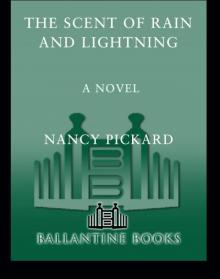 The Scent of Rain and Lightning
The Scent of Rain and Lightning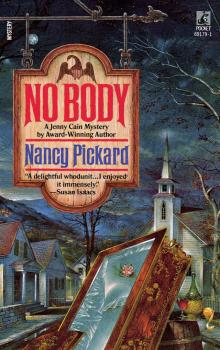 No Body
No Body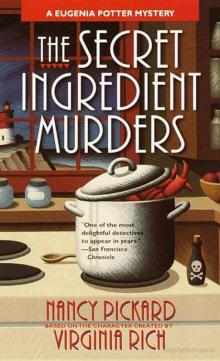 The Secret Ingredient Murders: A Eugenia Potter Mystery
The Secret Ingredient Murders: A Eugenia Potter Mystery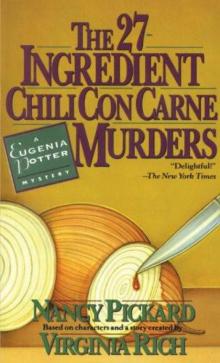 The 27-Ingredient Chili Con Carne Murders: A Eugenia Potter Mystery
The 27-Ingredient Chili Con Carne Murders: A Eugenia Potter Mystery Twilight
Twilight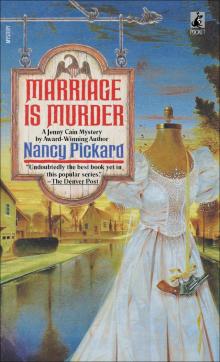 Marriage Is Murder
Marriage Is Murder I.O.U
I.O.U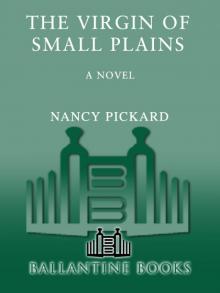 The Virgin of Small Plains
The Virgin of Small Plains Generous Death
Generous Death The Whole Truth
The Whole Truth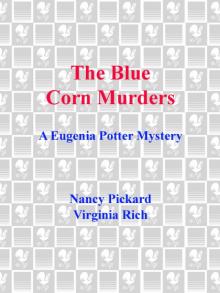 The Blue Corn Murders
The Blue Corn Murders Say No to Murder
Say No to Murder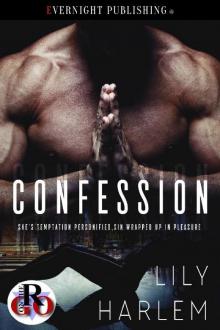 Confession
Confession Dead Crazy
Dead Crazy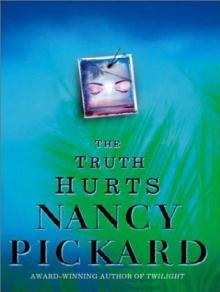 The Truth Hurts
The Truth Hurts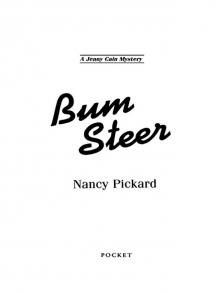 Bum Steer
Bum Steer